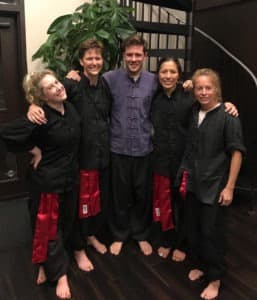About two years ago I wrote an article about rank in martial arts after Chris earned his red sash. We’ve had many tests recently, so I’ve decided to revisit it with some changes and additions. Enjoy!
How do you get a black belt? You find a competent teacher and a good school, begin your training and work hard. Someday—who knows when—it will come. It is not easy, but it’s worth it. It may take one year; it may take ten years. You may never achieve it. When you come to realize that the black belt is not as important as the practice itself, you are probably approaching the black belt level. When you realize that no matter how long or hard you train, there is a lifetime of study and practice ahead of you until you die, you are probably getting close to a black belt.
Kensho Furuya, Kodo
 We just had test where four very hard working, remarkable students earned their red sashes. They have all been practicing here at the dojo nearly since we opened, and you’ll recognize them as important fixtures both in Tai Chi and Adult Martial Arts classes.
We just had test where four very hard working, remarkable students earned their red sashes. They have all been practicing here at the dojo nearly since we opened, and you’ll recognize them as important fixtures both in Tai Chi and Adult Martial Arts classes.
Rank in Martial Arts
I want to take this opportunity to talk about the idea of rank in Martial Arts. Most people assume that rank and colored belts or sashes has been a part of Martial Arts since the beginning. This isn’t true. Jigoro Kano, founder of Judo, was the first person to use different colored belts to denote rank. This was in the 1880’s. Kung Fu, the first Martial Art, was founded at Shaolin Temple about 1500 years ago. What in the world did they do for 1400 years to show rank?
The truth is, until fairly recently, the concept of rank as we understand it didn’t exist. There was a teacher, and there were students. Of course, people generally recognized skill and experience as a differentiating factor, but there was no monthly testing for a new belt or stripe, no new color to put around your waist. Just years of hard work. In most dojos these days, rank is used as a carrot at the end of a stick to keep students coming, even though the classes are boring or they feel like they aren’t really improving. “If I keep getting a new belt, I guess I must be getting better,” most people think. This is silly.
The Art of Practice
Rank in Martial Arts is only worth the expended effort and experience gained from the process of earning it. You can buy a black belt or sash in a store for about $10. Yet without the years of work, it’s just a piece of cloth. In our school, it takes a fairly long time to get to the next rank. This is because the curriculum is huge and quite demanding, but also because we really want it to mean something. The tests are also very difficult for the same reasons. This is why it is so important to approach practicing Martial Arts with the attitude of effortless effort. If you only practice in order to get to the next rank, or, God help you, to Black Sash, you’ll never make it. You’ll always wonder why it’s taking so long to get to your next test, and the end will seem forever away. There should be no end in your mind. There should only be practice, working as hard as you can without concern for the outcome, be it the next rank, beating someone at sparring, or even an encouraging word from a senior student.
I like to ask students and myself, would I keep practicing even if I wasn’t going to get better? If you base your practice on getting the next rank, of course the answer is no. But if you practice because it makes you a better person, or simply because you love it, the answer is likely yes. After 20 years of practice, there are certainly times when I feel like I’m making no improvement. Yet I continue, because it is what I do. This keeps things simple for me. This allows me to throw all that I am into practice without worrying about the outcome. This allows me to live in the moment and just be.
When you see Ann, Erin, Katherine and Robin, ask them which is more important: being a Red Sash among the highest ranked students in the school, or the way that practice has transformed them as human beings.
See original post here.


